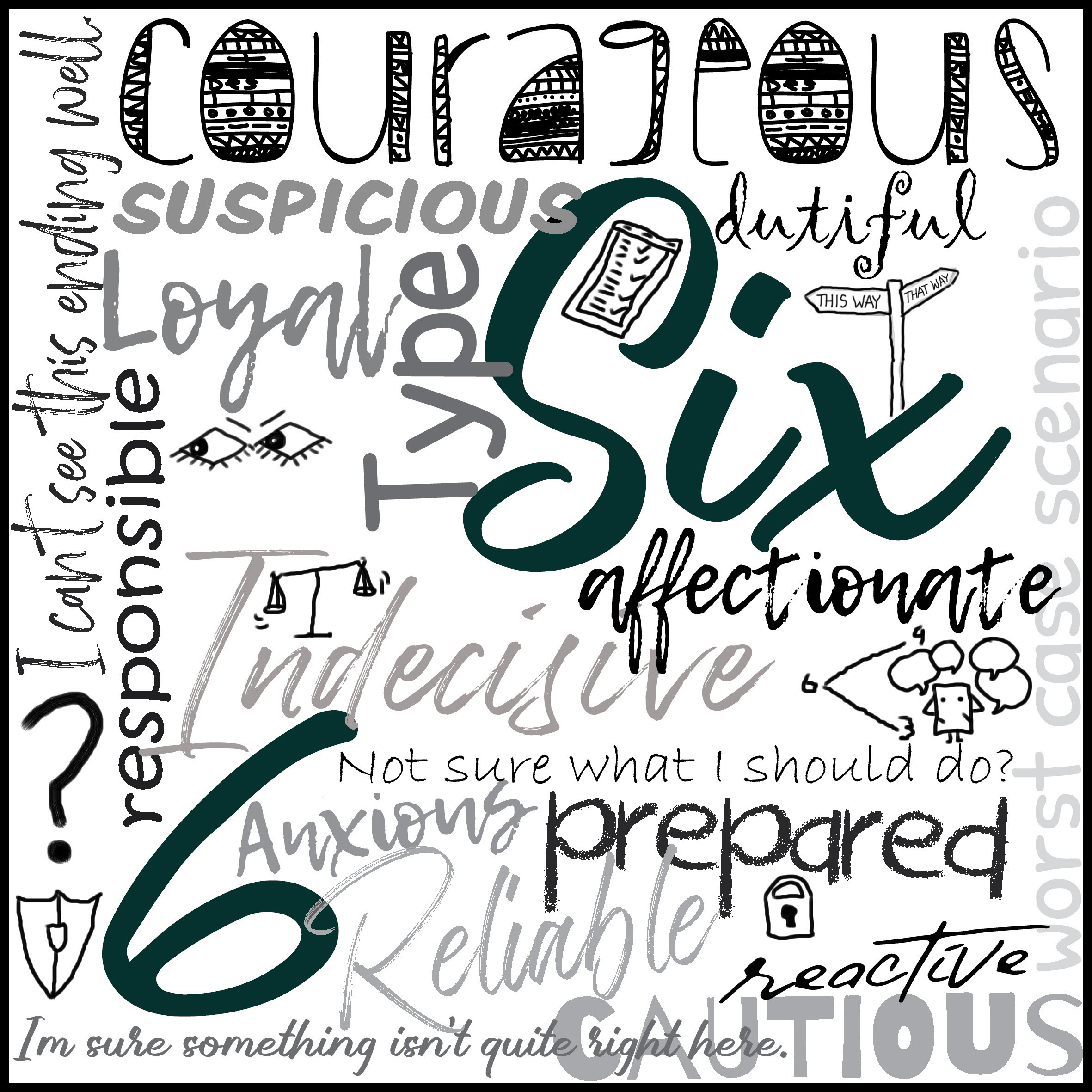Enneagram Type 6
The Loyalist
Explore the vigilant and engaging world of the Enneagram Type 6 personality—discover the commitment to security and loyalty that characterizes The Loyalist.
Curious to see if you're a Type 6?


Enneagram Type 6, known as "The Loyalist," is characterized by a strong commitment to security and reliability. Type 6s are cautious, vigilant, and highly value loyalty and trustworthiness. If you identify as a Type 6, you likely have a strong sense of responsibility and seek stability and safety in your environment, which may sometimes lead to anxiety or suspicion.
Despite these challenges, Type 6s contribute significantly to the world with their dedication and dependability. Their ability to anticipate problems and their commitment to their community can lead to a safer, more prepared society. By balancing their need for security with openness to new experiences, Type 6s can lead a balanced life, integrating their protective instincts with enriching interpersonal connections. Acknowledging their need for both safety and growth allows them to thrive and support their community effectively.
Strengths
Challenges
Early Development

As children, those who identify with Enneagram Type 6 often exhibit a marked need for security and support. They are usually cautious and seek stable environments, showing early signs of vigilance and a keen sense of danger. These children may appear anxious or hesitant, often seeking reassurance from adults as they try to navigate their surroundings. Their interactions with the world are characterized by a search for safety and a preference for known and trusted environments.
This early inclination towards security and caution can be both a strength and a challenge for Type 6s. On one hand, their vigilance can protect them and others from potential harm and prepare them for various life challenges. On the other hand, their need for constant reassurance can lead to dependency and a reluctance to face new situations. By learning to balance their need for security with their ability to handle uncertainty, these individuals can grow into resilient adults who are both protective and adaptable. Encouraging them to face their fears and engage in new experiences can help them develop confidence and a more balanced approach to life's uncertainties.
Young Adulthood

As they navigate their teenage years, Type 6 individuals often find themselves grappling with issues of security and trust. This stage of life can amplify their natural tendency towards caution and loyalty, leading them to seek stable relationships and environments. They may experience an intensified need for safety and reassurance, sometimes feeling anxious or suspicious of unfamiliar situations or people due to their protective nature.
During this period, it’s crucial for Type 6 teens to find environments where their need for security is acknowledged and where they can form trustworthy relationships. Encouraging them to engage in group activities like team sports, clubs, or community service can help them build confidence and establish a sense of belonging. Connecting with mentors and peers who provide steady support can also foster their development into confident individuals. By learning to balance their natural cautiousness with trust-building experiences, Type 6 teens can grow into dependable and resilient adults who value both safety and strong, supportive connections.
Workplace Behavior:
Type 6 individuals excel in environments that prioritize security, structure, and teamwork. Their loyalty and ability to foresee potential issues make them excellent risk assessors and reliable team players. However, it's important for them to manage their tendency towards anxiety and skepticism to maintain a positive and productive work atmosphere. By leveraging their strong sense of duty and preparedness, they can help create a stable and secure work environment. Balancing their need for security with openness to change and innovation enables them to be both supportive and adaptable team members.
Explore further insights on Type 6s in the workplace.
Interpersonal Relationships:
Type 6 individuals are known for their loyalty and commitment, which are cornerstone traits in their relationships. However, their interactions can improve significantly by balancing their natural caution and skepticism with trust and openness. It's crucial for Type 6s to manage their anxiety and fear of betrayal to avoid seeming overly suspicious or defensive. By actively participating in trust-building activities and being open to vulnerability, they help create deeper and more secure connections. Recognizing that they are valued for their steadfastness as well as their willingness to engage in emotional depth is key to nurturing supportive and enduring relationships.
Discover more about Type 6s in relationships.
Famous Women With Type 6 Traits
Complex Figures with Type 6 Traits
Enneagram Type 6 Wings
Enneagram Type 6 wings are the adjacent types that influence Type 6, leading to two variations: 6w5 and 6w7. Type 6w5, "The Defender," combines the security-oriented and loyal nature of Type 6 with the intellectual and analytical traits of Type 5, creating a personality that is both cautious and inquisitive, deeply committed to understanding complexities while prioritizing safety. In contrast, Type 6w7, "The Buddy," blends the loyalty and risk-aversion of Type 6 with the enthusiasm and adventurousness of Type 7, resulting in an individual who is both engaging and careful, seeking excitement but with a keen eye on potential pitfalls.
Cautious, inquisitive, thorough, and security-oriented.
Engaging, careful, enthusiastic, and adventure-seeking.
The 9 Types
Principled, purposeful, self-controlled, and perfectionistic.
Generous, demonstrative, people-pleasing, and possessive.
Adaptable, excelling, driven, and image-conscious.
Expressive, dramatic, self-absorbed, and temperamental.
Perceptive, innovative, secretive, and isolated.
Engaging, responsible, anxious, and suspicious.
Spontaneous, versatile, acquisitive, and scattered.
Self-confident, decisive, willful, and confrontational.
Receptive, reassuring, agreeable, and complacent.